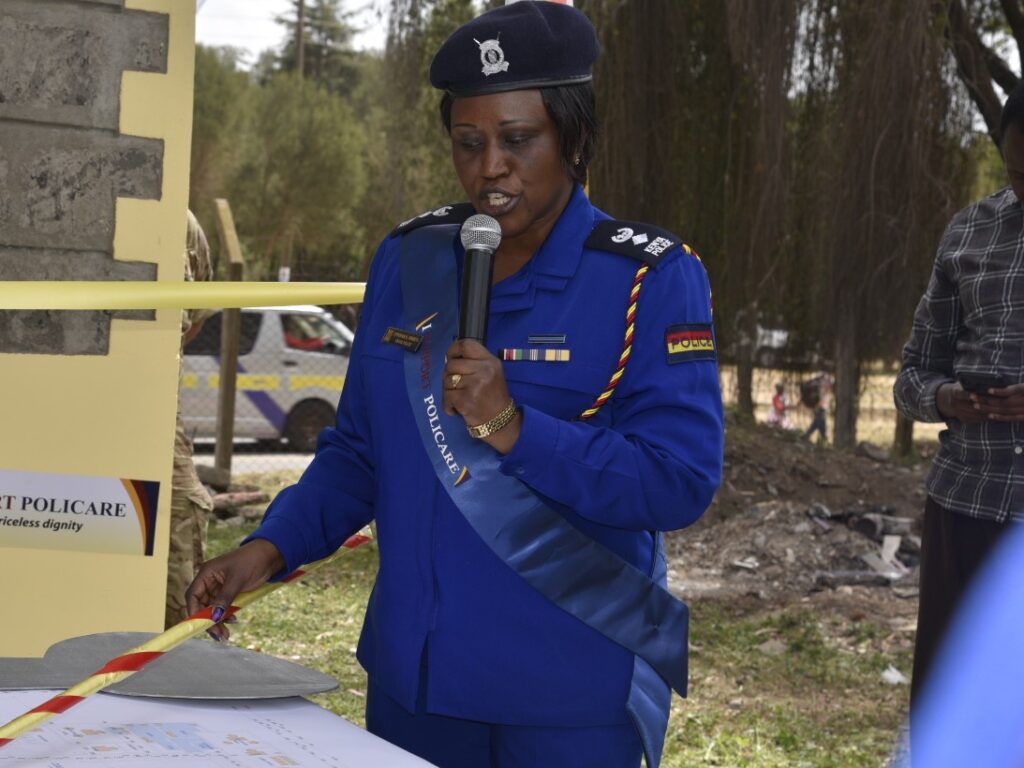
POLICARE heralds a new dawn in policing sensitivity towards sGBV
For more than three decades, survivors of sexual and gender-based violence (SGBV) in Laikipia have struggled to access the medical, legal and psychosocial support required when seeking justice.
Laikipia County police headquarters deals with an average of 15 SGBV cases each month covering cases of Female Genital Mutilation (FGM), child marriages, and physical and emotional violence. Many of these survivors have given up seeking justice due to the costs of pursuing medical and legal challenges, with only half of cases reported to the police being followed to conclusion.
It is this situation that inspired survivors of gender-based violence, the National Police Service (NPS), and donors to hold workshops that addressed these challenges and tried to seek solutions. In 2022, these engagements resulted in POLICARE’S (Police Cares) establishment of a one-stop centre that would cater for the needs of SGBV survivors by improving access to justice and providing them with dignity.
Partnering for a cause
The POLICARE Centre is an ultra-modern facility at Laikipia County police headquarters, developed through a joint initiative of the National Police Service, the REINVENT programme, and the British Army Training Unit (BATUK). The facility is modelled around a multidisciplinary, integrated, and comprehensive approach to managing survivors of gender-based violence. It serves five counties in the Upper Eastern region – Nanyuki, Isiolo, Laikipia, Samburu and Meru – where there have been concerning levels of SGBV violations, including rape, defilement, Female Genital Mutilation (FGM), and child marriage.
Key actors on the referral pathway who operate from the Centre include the National Police Service, the Ministry of Health, the Office of the Directorate of Public Prosecution (ODPP), and the Judiciary. This collaboration is aimed at ensuring quick turnaround and access to justice for those who seek services at the Centre, as well as improving coordination between these critical actors on the referral pathway. Services provided at the Centre include forensic investigations, health, legal, justice, counselling, and psychosocial support.
This Centre provides a welcoming safe space for survivors. It has a warm reception area and waiting room, an interview room for adults, and a therapy room. Children are interviewed in a special child-friendly room. Zipporah Nderitu, an NPS officer, details the Centre’s support: “We have a trauma centre to address the traumatic and painful experiences the survivors go through, and which make them feel like they don’t belong. The Centre is manned by psychologists to help survivors to recover, and to prepare for the experience of retelling their stories during trial. During these sessions, they are counselled on preparing to encounter perpetrators in court.”
Restoring dignity
The POLICARE Centre was borne out of the need to restore dignity to survivors of sexual and gender-based violence. According to Jaki Mbogo, Chief of Party of the REINVENT Programme, the intervention allows the survivor to access judicial and policing services in a dignified way: “Dignity is being able to report confidently and access services in a safe and secure manner. It is ensuring that survivors’ dignity is not eroded just because they have made a report; but they are treated in a humane way, worthy of the support and service that they need.”
Mbogo adds that through the POLICARE Centre, persons in need of dignity and justice will be able to access these services easily. “The POLICARE Centre affords us a contact point where any person can meet us in a way that caters for cost and convenience.” Mbogo admits that for many years, survivors have had to contend with emotionally draining and challenging processes to access justice. “Police stations, which play a central role in SGBV, have been regarded as an intimidating place for a woman who has gone through violence. There are still a lot of complaints around how cases of violence against women and girls (VAWG) are handled at the police station.”
These associations remain. But it is projects such as The POLICARE Centre that seek to reshape this narrative. These challenges prompted the REINVENT programme to work in partnership with the National Police Service and BATUK to establish the POLICARE Centre as a long-term solution to the many problems experienced by survivors of SGBV.
Mariana Muia, technical lead for the REINVENT Programme in the Upper Eastern Region, says that this public-private partnership has helped to pool together resources, which hastened the building of the Centre. “For instance, during the construction period, we were able to benefit from the National Police Service (NPS) infrastructure. This included the Gender Desk officers and land donated by the government.” Daniel Wathome of the NPS, who is the vice-chair of the POLICARE National Technical Committee, concurs. He says this intervention has helped the police service to create a policy document that provides practical steps on how to establish similar centres across the 47 counties. “The policy will facilitate cooperation and synergy among POLICARE Centre service providers, including a framework for the delivery of quality and comprehensive services.”
Getting down to work
For POLICARE in Laikipia, the next stage is implementation. This will involve sensitising police officers on the standard operating procedures for the handling and storage of forensic evidence in prevention and response to SGBV. Similarly, the implementation will be delivered at different levels. At the national level, the National Steering Committee will oversee the policy around the implementation of POLICARE Centres. At county level, the County Implementation Committees chaired by the County Police Commanders and comprising of the judiciary, Office of the Directorate of Public Prosecution, Probation officers, Law society of Kenya, Gender officers, Children officers, County Health Department, civil society, and Faith Based Organisations will oversee the smooth operation of the Centre at that level.
Nderitu says the Centre will offer a far smoother access to the justice pathway. A survivor reporting an SGBV case speaks to a minimum of 27 people. At the police station alone, they start with the report office, then the Gender Desk and crime offices. By the time they are being referred to the hospital, they have spoken to six police officers in a station. “It is estimated that they would have spoken to at least 27 people on this referral pathway by the time they get to court. At the POLICARE Centre, this is reduced to 5.”
Nderitu adds that the Centre will also provide solid data on SGBV cases in the county. “We have been looking for quality and verifiable data for SGBV because different actors have different data sets. The media, police, CSOs, and the hospitals each have separate data currently.” At the POLICARE Centre, every initial report gathered from investigations, forensic analysis, psychosocial support, and probation is to be stored in one place. This will inform policy and programming.
Muia is upbeat that the POLICARE systems that are in place are sustainable because the Centre is owned by the government through the NPS, which will deploy officers and other resources to run it. Already, the Laikipia County Implementation Committee has been established to oversee the operation of the Centre. It is chaired by the County Police Commander, John Nyoike, who says: “We commit to nurture and upscale what we have achieved through the REINVENT programme and do it even better.”
Nyoike says POLICARE will consult with experts to ensure SGBV cases are addressed effectively. “In terms of chain-of-custody of exhibits, this is now well taken care of. All the exhibits that will be waiting for forensic examination will be properly stored at the POLICARE Centre.” The NPS officers said the creation of the POLICARE Centre is a success they will not only protect, but ensure it remains sustainable and permeates police stations in other regions of the country.
